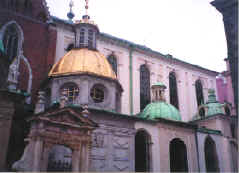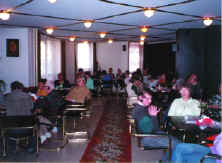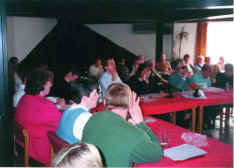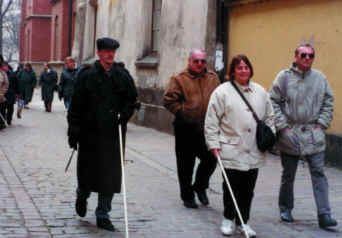Polish Blind Struggle for New Identity
after the Fall of Communism
by Homer Page
 It
has been a decade since the collapse of the Soviet Union, but the legacy of that
regime still haunts
people with disabilities in the lands that were ruled by the communists. During
the last five years, the blind community in Poland sought assistance from the
National Federation of the Blind (NFB). The National Association of the Blind
(NAB) of Poland recognizes the need to end the economic and social isolation
imposed on the Polish blind by the custodial communist order. It
has been a decade since the collapse of the Soviet Union, but the legacy of that
regime still haunts
people with disabilities in the lands that were ruled by the communists. During
the last five years, the blind community in Poland sought assistance from the
National Federation of the Blind (NFB). The National Association of the Blind
(NAB) of Poland recognizes the need to end the economic and social isolation
imposed on the Polish blind by the custodial communist order.
The collaboration between blind Americans and the Polish
blind community is one example of the growing global cooperation that is now
occurring among disability groups around the world. In addition to America,
persons with disabilities from Saudi Arabia, Sweden, and other European
countries have reached out to second and third world members of the disability
community to offer assistance. International organizations of persons with
disabilities are growing in numbers. The disability community, as every other
community, is taking on a global scope.
For one thousand years, Poland was victimized by invaders
from the east and west. World War II began with the invasion of Poland by Nazi
Germany. It was the location of one of the very worst concentration camps.
Auschwitz, located in southwest Poland, is synonymous with the evil of the
Holocaust. Some of the most bitter fighting of the war raged across its
landscape. Early in the war, the USSR invaded and took many Polish citizens to
slave labor camps in Russia. By the time the war ended, ten million Poles had
been killed, half were Jewish, and the other half were Christian; and then,
three years after the war ended, Poland was turned into a communist satellite of
the USSR.
The Russians dominated Poland for over forty years. The Poles
hated the heavy handed oppression rained down on them by the Russians, but for
the blind, the most lasting effect of Russian rule is the legacy of dependency
and obsolete economic and blindness skills taught under communism. The old
system provided housing, transportation and work in cooperatives that were
specially set up as sheltered workshops for the blind. Blind persons in Poland
lived for two generations in an environment of governmental subsidies, isolation
and paternalism.
When the communist world collapsed, there were no longer
funds or commitments in the new free market economy to subsidize the old system
and the blind of Poland were ill prepared to make it on their own. The leaders
of the Polish National Association of the Blind recognized the need for change.
They turned to their neighbors in Western Europe, and especially to the National
Federation of the Blind in America for new ideas, training, and most
importantly, for a new spirit of freedom and independence.
Beginning in the mid-90ís, Polish representatives attended
the national conventions of the NFB. They traveled in America to learn about the
NFB training centers in Rustin, Louisiana, Minneapolis, Minnesota, and Denver,
Colorado. They invited the training centers to send teams to Poland to conduct
training programs for members of the NAB. Four American teams involving over
forty persons traveled to Poland to conduct training seminars for the blind.
Over five hundred members of the NAB participated in the seminars. Internships
for Polish students with the NFB centers are under discussion.
The NFB is the largest organization of blind persons in
America. Founded in 1940, it has been a powerful voice for security, equality
and opportunity for blind persons. Often controversial, the NFB has developed
training centers that promote independence. These centers are modeled on the
programs created at the Iowa Commission for the Blind during the 1960ís and
Ď70ís under the leadership of Dr. Kenneth Jernigan. Dr. Jernigan was a
leader of the organization from the early 50ís until his death in 1998. He was
NFB president from 1968 to 1986.
The NFB has been active in international organizations of the
blind since its founder, Jacobus ten Broek became instrumental in the founding
of the World Federation of the Blind. The NFB has previously conducted training
programs in Africa and South America.
Delegations from Australia, Canada, Sweden, Finland, the
United Arab Emerits, and India have studied the NFB centers. In 1991, I was
invited to lecture in Sweden on the philosophy and practice of the NFBís
approach to the rehabilitation of the blind.
|

|
Listening intently at the meetings
via headphones through an interpreter
The training focus in each of the centers is on the
development of affirmative attitudes and independent living skills that permit
students to live and work productively. Self sufficiency and active responsible
participation in the blind community are goals for each student. Students study
Braille, the operation of computers using adaptive technology, independent
travel, food preparation, and money management. Confidence building activities
that include wood shop, rock climbing, and the preparation of formal dinners
challenge students. Career planning and work experience are integrated into each
studentís experience. Training is done in a residential setting. A student
program at one of the NFB centers takes approximately nine months to complete.
Mr. Tadeusz Madzia, President of the Polish NAB, asked the
NFB to train his members to provide the type of programs offered in America. He
is also a member of the National Parliament. During the communist era, he worked
as a manager and finally as a director in the system of collaboratives. After
Poland became independent, he was asked to run for a seat in Parliament on the
Solidarity slate. He is the Vice President of the governmentís national fund
for programs that serve persons with disabilities. He is a sophisticated
politician and a gracious host.
Mr. Madzia attended the 1995 NFB convention, and then came to
Colorado to visit the NFB training center in Denver. He and his colleagues were
especially impressed by the way in which blind students at the center were
learning to travel independently. Blind persons in Poland seldom go out alone.
But the American students learn to use a long, white cane and public
transportation. He was also impressed by the way in which blind persons in the
Denver area work in mainstream occupations. He asked if the Americans could
share their experiences with the blind of Poland.
The National Association of the Blind in Poland owns a
training center located in Ustron Zawodzie. Ustron Zawodzie is a small resort
community in the Carpathian Mountains in southwest Poland, only a few kilometers
from the border with the Czech Republic. The NAB facility is fully equipped with
a kitchen and dining hall capable of serving 200 guests. It has sleeping rooms,
meeting rooms, a library and gymnasium. Hiking trails parallel the head waters
of the Vistula River.
Four two- week seminars were planned and conducted. Ten
Americans and 125 Poles participated in each seminar. I developed the curriculum
for the seminars, and led two of them. At that time, I was the Director of the
Colorado Center for the Blind. Disability Life Editor, Angie Wood, was a
co-leader of one of the seminars. Joyce Scanlan, Director of the Minnesota
Center for the Blind, led two of the seminars. Staff from the three centers
conducted the training.
The NAB coordinator for the seminars was Dr. Ludwik
Rosiennik. He is a professor of economics and Director of International
Relations for the NAB. When he was an infant, his family was taken by the
Soviets to Russia. There, they were put into a forced labor camp. He was held
captive until he was eight years old. After the war ended, he and his family
returned to Poland, but the effects of malnutrition left him blind.
Mr. Madzia and Dr. Rosiennik ask that independent travel,
employment and advocacy be emphasized. They also wanted us to discuss the way in
which consumer organizations are funded in America. They were interested in the
way that we balance the demands of a direct service program with advocacy. Many
of their questions are similar to the ones we are asking ourselves in America.
The NAB of Poland is a peculiar organization from the point
of view of Americans. It violates our beliefs about the separation of consumer
organizations from those that administer government programs. It administers the
National Rehabilitation Program for the Blind, while at the same time it is the
only membership organization for blind persons in Poland. A sister organization
serves persons with other disabilities in much the same way.
Membership in the NAB confers many benefits. There are
housing and transportation subsidies. Doctors associated with the NAB routinely
certify its members unable to work. This makes them eligible for financial
support, but it is also a barrier to employment. The Polish blind have numerous
disincentives to work.
 |
Dr Ludwik Rosiennik and other
members of the seminar
A wide generation gap exists within the NAB. Older members
are comfortable with the paternalism with which they lived for most of their
lives. However, younger people want to join the free wheeling Polish economy and
society. The young want to learn to travel independently, work in mainstream
occupations, and integrate into the sighted world. They are aggressive,
confident, and angry with their elders. On the other hand, the elders fear the
loss of security. They believe that it is impossible for blind persons to live
integrated lives. They resent the harsh implied judgment that they believe the
youth are making on the way in which they have lived.
The Polish are a warm and friendly people, but more than
once, we found ourselves in the middle of an inter-generational conflict in
which we were the objects of the controversy. The youth supported our message,
while the elders opposed it.
As the Poles talked, it became clear that the NAB is an arm
of the Polish government. It has not played a role in advocating for social and
legislative change. It has been dependent on the state for funding to operate
its programs and provide its services. The interest in ways to fund a consumer
advocacy organization grows out of the desire by the leaders and some of the
members to become less dependent on the Polish government for funds. Many of our
fund raising strategies are unknown in Poland. For forty years, the communist
run government controlled everything. The government provided the funding, and
of course it had the power to withhold it. They did not want an organization to
have an independent funding source, and thus, an independent power base. Now,
private membership organizations must develop strategies for raising funds if
they are to survive and establish an independent voice.
 |
Harold Wilson, Max Brooks, Joanne Wilson,
and Polish guide
Few things are more important to a blind person than the
ability to travel independently. The NFB centers train their students to travel
effectively. The Poles were amazed that the Americans expect blind persons to
travel independently. They have drawn a sharp distinction between persons who
have some vision and those who are totally blind. They are fearful for a totally
blind person to travel alone, but at the NFB centers, the persons who have
partial vision are asked to wear sleep shades while in training.
It is the experience of the NFB that one learns mobility
skills more completely when the student does not try to use untrustworthy sight.
One listens better, uses his or her cane more effectively, and thinks more
clearly. These alternative techniques work, while a dependency on limited vision
proves to be inadequate. One often is unable to function at night, or when
coming inside after being in bright light. One may fail to see dangerous
obstacles in the environment that he or she would have found if aggressively
using a long, white cane.
The Poles have historically used a short, white cane. This
cane has served primarily to identify the user as a blind person. The American
cane is used to explore the ground in front of the traveler. The American
trainers gave their Polish students sleep shades and a long white cane and took
them out into the streets. The Polish skepticism soon turned to excitement as
they discovered the freedom of independent travel.
The traditional employment for blind persons in Poland has
been massage and light industrial work done in sheltered workshops. But, with
the closing of the workshops, the unemployment among the blind has risen to over
ninety percent. Poland has legislation that requires businesses to hire a quota
of persons with disabilities. However, they have an option to pay a fee instead
of providing employment. Many choose this option. The general unemployment rate
in Poland is in double digits, so there is a lot of competition for jobs. The
blind do not do well in this competition.
The American trainers acknowledged that persons with
disabilities in the U.S. still have a high unemployment rate, perhaps as high as
65%. We shared with them the strategies which we use with our students. Our
students have a much higher success rate than do other blind persons. "In
order to work," we told them, "a blind person must have very good
alternative skills. They must have good specific job skills, and they must be
motivated. The blind worker can find employment and can be a successful
employee, but he or she must be well prepared."
It is hard for those who are blind to find employment in
Poland, but they must make the effort if they are to have a chance. They also
have to restructure the benefits system to eliminate work disincentives. Few
older people will work again, but the young will work if they get an education,
develop effective blindness skills, and maintain a spirit of pride and
independence.
The Poles enjoy dancing and singing. Each evening after
dinner, we met in the lounge for good music and friendship. The Poles taught
many of us that we could relax and enjoy dancing and singing with them.
Midway through the seminars, we took a day to go sight
seeing. Our hosts took us to the ancient city of Krakow. They introduced us to a
thousand years of Polish history. Along the road we passed the exit for
Auschwitz. We visited a school for blind children and drove past new suburban
developments that reflect the prosperity of the growing middle class in the new
free market Poland. Our Polish friends took us to the cathedral where Pope John
Paul II served as Bishop of Krakow. We listened to monks chant ancient prayers,
and felt the power of the church in Poland. We visited the Old Town, where every
quarter hour, a trumpeter reenacts the warning given a millennium ago as Tartar
invaders came near. We walked in the courtyard of the six hundred year old
University of Krakow. They took us shopping for souvenirs, and we bought gifts
to take home. Dragons and cut glass, and especially jewelry made from silver and
amber found their way into our bags. We stood with our friends in the presence
of a thousand years of culture. We understood better the courage and endurance
of the Polish people, and their abiding love of freedom.
We understood that their blindness and ours bond us together
in a global community. We hoped our experiences might help them, but we knew
that they would best be sustained in the hard days ahead by the Polish spirit
that they have inherited from forty generations of suffering and never giving in
to despair. They sing and dance, and they love freedom.
We returned to our lodgings with a greater respect for the Polish nation, and
a deeper faith in the ability of our new friends to meet the challenges that lie
ahead.
top of page |



